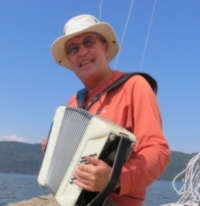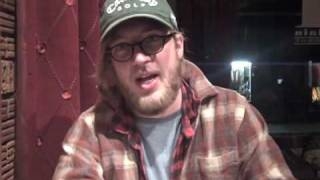Peter Hamlin
Christian A. Johnson Professor Emeritus of Music

- phamlin@middlebury.edu
Peter Hamlinteaches theory, electronic music, and composition at Middlebury. He is an active composer who has written numerous works for orchestra, band, choir, chamber ensembles, solo instruments, solo voice, music theater, and electronic media. He received his BA in music at Middlebury in 1973 where he studied composition with George Todd. He was a radio producer/host at KPBS-FM in San Diego from 1974-1980, and from 1980-1990 hosted a classical music program on KUNI-FM in Cedar Falls, Iowa. He also served as fine arts host on Iowa Public Television. He received an MM degree in composition at the University of Northern Iowa in 1989, studying there with Peter Michaelides. His PhD is from the Eastman School of Music where he studied composition with Joseph Schwantner and Samuel Adler. He taught at St. Olaf College in Northfield, Minnesota, from 1992 to 2004, and was appointed to the Middlebury faculty in 2004.
Here’s a recent student project, a collaborative composition/production by senior Middlebury music majors Jack Tipper and Mike McCann.
Watch the world premiere of Soul Mate and One Woman One Man from the song cycle by Peter Hamlin. Susanne Peck, soprano and Cynthia Huard, piano. Performed March 13, 2011.
This is one of several of Professor Hamlin’s pieces being premiered this year. On April 10 at 3:00 pm the Vermont Contemporary Music Ensembles will perform Meditation on Elzick’s Farewell and Singing Bowl.On April 22 at 8:00 pm, the College Orchestra performance will include a piece by Professor Hamlin, as well as premieres by Noah Silverstein ‘11 and Nicholas Tkach ‘11.
Watch Music Department chair, Peter Hamlin and music major Philippe Bronchtein perform their original electronic music at 51 Main
Courses Taught
MUSC 0215
Storytelling with Sound
Course Description
Storytelling with Sound: The Sound Designer's Art
In this course, students will learn about the evocative storytelling power of sound and its use in music, theater, film, television, video games and narrative media like radio and podcasting. The course is structured around weekly creative projects and 4 larger projects exploring the possibilities of expressive sound. Students will acquire a foundation of knowledge in acoustics and recording techniques and will work with sound recording, processing, and mixing tools along with basic video editing tools. The course will also explore a wide variety of sound design examples in popular films and TV shows and other media, with opportunities for analytical writing.
Terms Taught
Requirements
MUSC 1029
Visualizing Sound
Course Description
Visualizing Sound - Creating Animated Computer Art from Music
In this course we explore the many ways that sound and music can be transformed into animated computer art using a software tool called Touch Designer. The project-driven course will offer a series of creative projects that explore various approaches to the topic. In the class, we will learn about and apply concepts of music theory, acoustics, and the psychology of music, as well as computer programming techniques used within Touch Designer. Students will need a laptop computer (Windows or Mac) with ample storage space. No previous music or coding experience required.
Peter Hamlin, Christian A. Johnson Professor Emeritus of Music at Middlebury, is a Middlebury alum who has worked as a radio host/producer, TV host, composer, performer, and music professor. At Middlebury, he taught courses in music theory, composition, electronic music, and served as Music Department Chair for many years.
Terms Taught
Requirements

